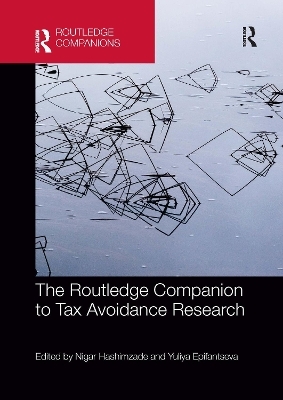
The Routledge Companion to Tax Avoidance Research
Routledge (Verlag)
978-0-367-65616-4 (ISBN)
An inherently interdisciplinary subject, tax avoidance has attracted growing interest of scholars in many fields. No longer limited to law and accounting, research increasingly has been conducted from other perspectives, such as anthropology, business ethics, corporate social responsibility, and economic psychology. This was –recently stimulated by politicians, mass media, and the public focussing on tax avoidance after the global financial and economic crisis put a squeeze on private and public finances. New challenges were posed by changing definitions and controversies in the interpretation of tax avoidance concept, as well as a host of new rules and policies that need to be fully understood.
This collection provides a comprehensive guide to students and academics on the subjects of tax avoidance from an interdisciplinary perspective, exploring the areas of accounting, law, economics, psychology, and sociology. It covers global as well as regional issues, presents a discussion of the definition, legality, morality, and psychology of tax avoidance, and provides guidance on measurement of economic effect of tax avoidance activities. With a truly international selection of authors from the UK, North America, Africa, Asia, Australasia, Middle East, and continental Europe, with well-known experts and rising stars of the field, the contributors cover the entire terrain of this important topic.
The Routledge Companion to Tax Avoidance Research is a ground-breaking attempt to bring together scholarly research in tax avoidance, offering rigorous academic analysis of an important and hotly debated issue in a structured and balanced way.
Nigar Hashimzade is Professor of Economics at Durham University, Fellow of CESifo Research Network, and Research Fellow at the Institute for Fiscal Studies and at the Tax Administration Research Centre. Yuliya Epifantseva is a US-based attorney with expertise in corporate tax law. After receiving her Ph.D. in economics from Cornell University and J.D. from NYU School of Law, she practiced law with Davis Polk & Wardwell LLP in New York. She is currently based in Boston.
1. Introduction (Yuliya Epifantseva and Nigar Hashimzade) Part A. Tax Avoidance: Definition and Trends 2. Historical and case law perspective on tax avoidance (Jane Frecknall-Hughes) 3. Tax avoidance culture as legislative tax reduction engine (Henry Ordower) 4. ‘A cloud of words’ or ‘trompe l’oeil’: The doctrine of sham and tax avoidance (Miranda Stewart) Part B. General Anti-Avoidance Rules 5. General Anti-Avoidance Rules and the rule of law (Rebecca Prebble and John Prebble) 6. The role and meaning of "purpose" in statutory GAARs (Graeme Cooper) 7. General Anti-Avoidance Rules in Canada: history, scheme, source, and enforcement (Vokhid Urinov) 8. Formulating a General Anti-Abuse Rule (GAAR) in tax legislation: insights and recommendations (Reuven S. Avi-Yonah and Amir Pichhadze) Part C. Regional and Global Perspectives in Tax Avoidance 9. Text, intent and taxation in the United States, the United Kingdom and France (Steven A. Dean, Lawrence Solan, and Lukasz Stankiewicz) 10. Tax avoidance in Japan (Tadao Okamura and Takako Sakai) 11. The containment of corporate tax avoidance in Italy (Giulio Allevato and Carlo Garbarino) 12. Tax avoidance issues in Turkey (Leyla Ateş) 13. Tax avoidance: The Indian perspective (Tarun Jain) 14. Securing tax compliance with collaboration: the case of Cooperative Compliance in Denmark (Karen Boll) 15. Corporate tax evasion and avoidance in developing countries (Bodo Knoll, Nadine Riedel, Farzaneh Shamsfakhr, and Kristina Strohmaier) 16. Trade misinvoicing (Volker Nitsch) 17. Tax avoidance and Global Wealth Chains (Leonard Seabrooke and Duncan Wigan) 18. Arrested development in Africa’s Global Wealth Chains: accountability and hierarchy in the offshore world (Attiya Waris and Leonard Seabrooke) Part D. Tax Avoidance in an Individual Decision 19. Individual attitudes and social representations of taxation, tax avoidance, and tax evasion (Matthias Kasper, Jerome Olsen, Christoph Kogler, Jennifer Stark, and Erich Kirchler) 20. Taxing high-income earners: tax avoidance and mobility (Alejandro Esteller-Moré, Amedeo Piolatto, and Matthew D. Rablen) 21. Tax practitioners and tax avoidance: gaming through authorities, cultures, and markets (Elea Wurth and Valerie Braithwaite) 22. Optimal income tax enforcement in the presence of tax avoidance (Duccio Gamannossi degl’Innocenti and Matthew D. Rablen) Part E. Tax Avoidance and Society 23. Tax avoidance and morality (Zoë Prebble and John Prebble) 24. Ideology of tax avoidance (William B. Barker) 25. Ethical issues in the use of tax intermediaries (Jane Frecknall-Hughes) 26. Distinguishing tax avoidance and evasion (Allison Christians) 27. Unacceptable tax behaviour and corporate responsibility (John Hasseldine and Gregory Morris) 28. Tax avoidance, power, and politics (Lynne Oats and Gregory Morris)
| Erscheinungsdatum | 01.10.2020 |
|---|---|
| Reihe/Serie | Routledge Companions in Business, Management and Marketing |
| Verlagsort | London |
| Sprache | englisch |
| Maße | 174 x 246 mm |
| Gewicht | 453 g |
| Themenwelt | Recht / Steuern ► EU / Internationales Recht |
| Recht / Steuern ► Steuern / Steuerrecht | |
| Wirtschaft ► Betriebswirtschaft / Management ► Rechnungswesen / Bilanzen | |
| Wirtschaft ► Volkswirtschaftslehre ► Wirtschaftspolitik | |
| ISBN-10 | 0-367-65616-7 / 0367656167 |
| ISBN-13 | 978-0-367-65616-4 / 9780367656164 |
| Zustand | Neuware |
| Informationen gemäß Produktsicherheitsverordnung (GPSR) | |
| Haben Sie eine Frage zum Produkt? |
aus dem Bereich


